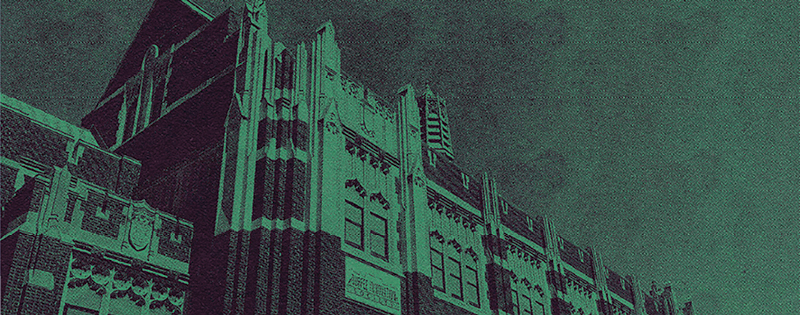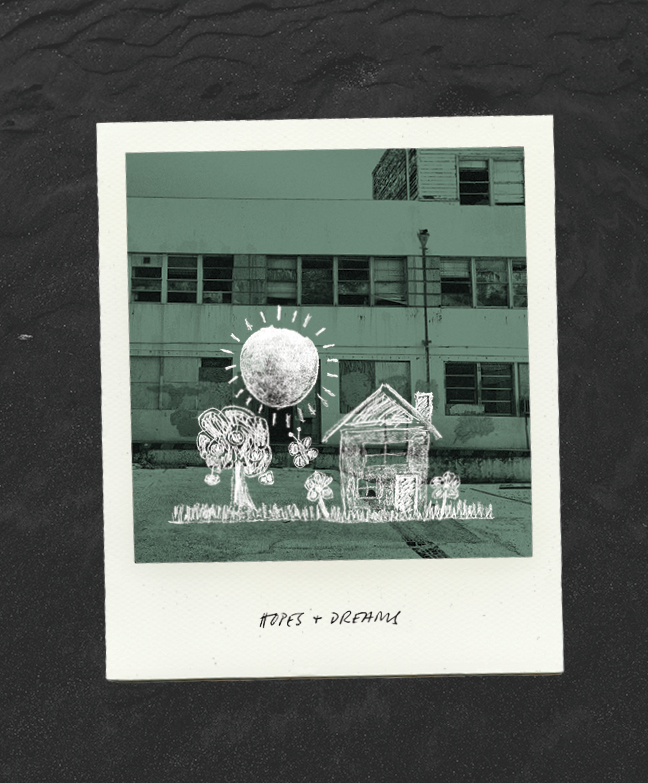
Chris Lambert (MDiv ’06) is the founder and CEO of Life Remodeled, a nonprofit organization in Detroit, Michigan, that renovates and repurposes former school buildings into opportunity hubs, repairs owner-occupied homes, and mobilizes volunteers to beautify areas in surrounding neighborhoods. Learn more about Life Remodeled at LifeRemodeled.org.
Jerome Blanco: Life Remodeled describes its focus as “the intentional and equitable revitalization of Detroit neighborhoods distinguished by their significant need and radical hope.” I’d like to ask you, in your own words, how you would describe the work that Life Remodeled does.
Chris Lambert: When people ask us what we do, I usually like to start with the “why” first. We believe that largely as a result of our country’s deep and tragic history of systemic racism—including slavery, Jim Crow, redlining, the GI Bill, mass incarceration, and so much more—many Black families in America are still not experiencing equitable access to opportunities to thrive in the areas of education, economic prosperity, and health and wellness. While Life Remodeled does not have the power to end systemic racism, we partner with Detroit community members and students to repurpose vacant school buildings into one-stop hubs of opportunity for entire families to thrive.
Life Remodeled does more than renovate iconic buildings. We fill them with the best and brightest nonprofits, and several amazing for-profit entrepreneurs, that serve the community. No one organization has the solutions to all of society’s challenges. True social impact happens when we work collaboratively, not only among our respective organizations but most importantly with the students and community members who live in the communities we partner with.
Additionally, we repair owner-occupied homes each year by providing hard-working families with the options to receive a new roof, furnace, or windows free of charge. And through our recurring Six Day Project, we mobilize thousands of volunteers to remove blight and beautify four square miles in only six days.
JB: Can you say more about some of Life Remodeled’s ongoing projects?
Chris Lambert (MDiv ’06) is the founder and CEO of Life Remodeled, a nonprofit organization in Detroit, Michigan.

Jerome Blanco (MDiv ’16) is editor in chief of FULLER magazine and Fuller’s senior content editor.
Chris Lambert (MDiv ’06) is the founder and CEO of Life Remodeled, a nonprofit organization in Detroit, Michigan, that renovates and repurposes former school buildings into opportunity hubs, repairs owner-occupied homes, and mobilizes volunteers to beautify areas in surrounding neighborhoods. Learn more about Life Remodeled at LifeRemodeled.org.
Jerome Blanco: Life Remodeled describes its focus as “the intentional and equitable revitalization of Detroit neighborhoods distinguished by their significant need and radical hope.” I’d like to ask you, in your own words, how you would describe the work that Life Remodeled does.
Chris Lambert: When people ask us what we do, I usually like to start with the “why” first. We believe that largely as a result of our country’s deep and tragic history of systemic racism—including slavery, Jim Crow, redlining, the GI Bill, mass incarceration, and so much more—many Black families in America are still not experiencing equitable access to opportunities to thrive in the areas of education, economic prosperity, and health and wellness. While Life Remodeled does not have the power to end systemic racism, we partner with Detroit community members and students to repurpose vacant school buildings into one-stop hubs of opportunity for entire families to thrive.
Life Remodeled does more than renovate iconic buildings. We fill them with the best and brightest nonprofits, and several amazing for-profit entrepreneurs, that serve the community. No one organization has the solutions to all of society’s challenges. True social impact happens when we work collaboratively, not only among our respective organizations but most importantly with the students and community members who live in the communities we partner with.
Additionally, we repair owner-occupied homes each year by providing hard-working families with the options to receive a new roof, furnace, or windows free of charge. And through our recurring Six Day Project, we mobilize thousands of volunteers to remove blight and beautify four square miles in only six days.
JB: Can you say more about some of Life Remodeled’s ongoing projects?
Chris Lambert (MDiv ’06) is the founder and CEO of Life Remodeled, a nonprofit organization in Detroit, Michigan.
Jerome Blanco (MDiv ’16) is editor in chief of FULLER magazine and Fuller’s senior content editor.
CL: Back in the day, Detroit school buildings were built in the center of communities, and they were designed as hubs of opportunity for academics, athletics, and social advancement. But when a school building closes and becomes vacant, it can become a dagger to the heart of hope for a community.
In 2017, the Detroit Public Schools Community District invited us to repurpose the former Durfee Elementary-Middle School building. I can’t begin to tell you how many real estate developers and potential funders walked through Durfee with me, heard our vision, then sternly looked me in the eye and told me to run away from this project as fast as I could! Many said there was no possible way we’d ever get this building even 50 percent occupied, because we were surrounded by residential property without a business in sight, and the majority of residents live below the poverty line.
Immediately, Life Remodeled began engaging students and community members who lived within a four-mile radius surrounding the soon-to-be-vacated Durfee building in order to discover what the community desired most—what their hopes and dreams were for possible opportunities. Three categories rose to the top: youth programming, jobs, and community resources. Next, Life Remodeled raised all the capital needed to renovate this 143,000-square-foot building and recruited Detroit’s best and brightest organizations to become tenants—organizations that offer youth mentorships, literacy programs, job placement assistance, occupational therapy, and so much more. Each year our partners help 4,500 Detroiters gain access to job opportunities, 2,500 students experience educational programming, and more than 10,500 children and families receive a wide variety of community resources. Today, the Durfee Innovation Society (DIS) is 100 percent occupied with 39 fantastic organizations. Of these organizations, 77 percent are led by people of color, and 67 percent are led by women.
The keys to ensuring long-term community transformation in the areas of youth programming, jobs, and community resources are: (1) Always have the most effective tenants in place who are providing the most impactful programming; (2) keep the tenants happy, and help them become even better as a collective whole; and (3) continuously collaborate and innovate in partnership with community and student leadership.

At full occupancy, with thriving organizations who can prove significant outputs and outcomes, we have demonstrated that our model is appealing to high-impact organizations, both nonprofit and for-profit. In order to fully support them, we have created a staff culture and environment that meets and exceeds their requirements. The fact that our lease rates are below market value certainly helps. We also provide our tenants with free access to the following spaces: the auditorium, arcade, laundromat, multipurpose room, lounge, and gym. Lastly, we ensure the opportunity hub remains a secure and safe space for staff, volunteers, clients, and community members.
As it relates to financial sustainability, the DIS is debt-free and financially independent as a result of the income generated from tenant leases as well as from rentals of the building’s auditorium, gym, and youth programming space. Because we raise the majority of our capital stack through philanthropic gifts, we are able to charge lease rates that are significantly less than market value.
Our plan for our next project is to repurpose the former Cooley High School, which has been sitting vacant since 2010. The windows and much of the copper have been ripped out, there was a fire that decimated the auditorium, and there are substantial active roof leaks that are on the verge of destroying the very foundation of this building if they aren’t repaired soon. Even though all of this is true, the story of Cooley High School does not have to be over. We have an opportunity to put this facility to use—in ways the community wants—before it’s too late. Although we have not yet purchased the property, we have already signed LOI agreements that equate to 75 percent of all leasable space being precommitted to lease by seven dynamic organizations who will deliver impactful opportunities directly requested by Cooley community members.
JB: Besides this incredibly impactful work, Life Remodeled also has a stated key focus of building relationships across divides—which happens through your projects as much as it happens as a result of them. Can you speak to that particular mission of Life Remodeled, of why and how it’s core to the work you do?
CL: I’ve found that if you invite two people who are polar opposites on issues of race, religion, or politics to sit down at a table, look each other in the eye and work it out, nine times out of ten that won’t be a very productive conversation. However, if you invite those same two people to work shoulder-to-shoulder on an action-oriented project they both agree on, something “magical”—something spiritual—happens.
That said, we mobilize thousands of diverse volunteers over six straight days every year to work together with a unified purpose of removing blight on vacant properties. In the process, people begin to develop increased respect for one another. More than 80 percent of our Six Day Project volunteers experience positive change in their thoughts or feelings about people of another race, religion, political perspective, or socioeconomic status.
Additionally, it is very difficult for a new organization to build trust in a community where many have experienced significant trauma. We build trust through sustained, meaningful relationships with students and community members, including five consecutive years of neighborhood blight removal and home repairs, as well as the high-quality, free community events and resource giveaways we provide throughout the year. The trust Life Remodeled builds also extends to the new organizations we bring into the community as tenants at our opportunity hubs.
JB: You received your MDiv at Fuller and served as a pastor for a while. Can you talk about the process of making the transition from church ministry to your work now? How do you see the work to be connected?
CL: While at Fuller, I learned that Jesus spent the majority of his approximately three years of ministry with some of the most marginalized people, and that he was inviting me to follow him and his way of life in a similar way. I also learned that Jesus usually demonstrated the gospel—the arrival of the kingdom of God and its immediate and eternal availability to all who trust in Jesus—before he verbally communicated it.
I was a church planter and pastor in Metro Detroit from 2007 to 2014. As someone who is very passionate about sharing my faith, I intentionally launched Life Remodeled as a nonreligious organization. Interestingly, I’ve been able to share my faith more frequently and more impactfully through my work at Life Remodeled than I was able to as a church pastor, and I believe that is largely due to the fact that our organization is making such dramatic, tangible impact, which raises deeper questions of curiosity.
JB: What would you tell pastors and churches about what it means to invest in and care for the local communities and neighborhoods in which they find themselves?
CL: I personally believe Jesus is calling all of his followers to significantly invest our time, talents, and resources into the lives of those who are in the margins of society. I haven’t yet found a city on earth where there aren’t people experiencing oppression in some form or fashion. Therefore, we may not need to look very far to find opportunities, but we certainly do need eyes to see who and what Jesus cares most deeply about.
Regarding churches seeking to discern the Spirit’s leading in this matter, I’ve found one helpful exercise is to analyze the percentage of our budgets that are tangibly assisting people experiencing marginalization. Are we at 10, 25, or maybe even 50 percent? Where we invest “our” finances says a lot about what we believe.
JB: It’s always a gift to hear stories of hope—of good and just transformation—happening in our communities. Can you leave us with a story that has given you hope recently, about seeing renewal in your city and its communities?
CL: Andrea’s six-year-old son was referred to MetroEHS, one of Life Remodeled’s tenants at Durfee Innovation Society. MetroEHS provides pediatric therapy (ABA therapy, speech therapy, occupational therapy, etc.) for children and families in Detroit. However, after connecting with some of our Life Remodeled team and learning about the many other organizations in the building, Andrea began to take full advantage of multiple other opportunities for her family.
Her six-year-old son, in addition to participating in therapy, has also enrolled in a variety of our afterschool programs alongside his nine-year-old brother. They are learning to play the violin, and they participate in a golf program that helps build character. Andrea, her husband, and their children also never miss a LIT Friday—social activities for families hosted by Life Remodeled on the fourth Friday of every month.
In 2021, Andrea and her family experienced a devastating house fire. Andrea shared this trauma with our Life Remodeled team, and we jumped into action by providing her family with some immediate essentials like food, toiletries, and clothing. Andrea definitely wasn’t expecting this act of compassion. However, she was extremely grateful for the support we were able to provide during such a challenging time.
Andrea recently shared with us, “You all are building community, and our children absolutely love the programs.” What began as a referral to what first appeared to be just another office building has transformed into a support system for Andrea and her family. This is just one example of Detroiters who benefit from the Durfee Innovation Society and the holistic approach we take to neighborhood revitalization.
Andre Henry, singer-songwriter and author, shares hopeful wisdom from his work in the movement for Black lives.